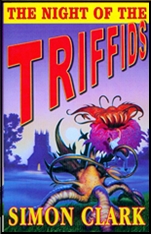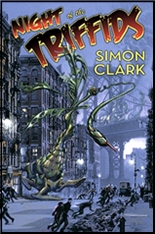Sat 27 Aug 2022
A Science Fiction Review by David Vineyard: SIMON CLARK – Night of the Triffids.
Posted by Steve under Reviews , Science Fiction & Fantasy[3] Comments
SIMON CLARK – Night of the Triffids. Hodder & Stoughton, UK, hardcover, 1991. New English Library, UK, paperback, 2001. Cemetery Dance Publications, US, hardcover, 2015.

So ends John Wyndham’s classic disaster novel The Day of the Triffids about an inadvertent invasion of predatory man killing plants that came to earth in a meteor shower and that become a threat to mankind when another meteor shower blinds most of the people on the planet. That story was told by Bill Masen, a sailor, who by chance was in hospital temporarily blinded when the meteor shower came and who awakens to find himself one of the few sighted people in a terrifying world.
In Simon Clark’s sequel to Wyndham’s classic thirty years have passed and our narrator is David Masen, Bill’s son, one of the survivors from the original colony on the Isle of Wight where humanity is rebuilding and where David is a pilot who helps keep contact with the scattered outposts of survivors around around the world and keep track of the deadly triffids.
It is not a safe world, and it becomes even more unsafe when the skies are plunged into darkness in a shocking turn that threatens the tenuous hold of humanity to their former place as masters of the world much less as survivors.
That plunge into darkness will send David Masen on a quest to unite the small colonies of mankind that survive, especially to New York where he finds a semi fascistic state led by the father of the beautiful Kerris, and ends up joining a revolution against the slave state as he learns more disturbing facts about growing signs of intelligence among the deadly triffids and the intentions of the King of New York.
John Wyndham was the rare Science Fiction writer who broke out of the relative ghetto of the genre to critical acclaim and popularity. It didn’t hurt that books like The Day of the Triffids and The Midwich Cuckoos (filmed as Village of the Damned with George Sanders) were made into popular films or that his shorts stories like “Consider Her Ways†were adapted for The Alfred Hitchcock Hour.

Wyndham came out of the British tradition of Social Science Fiction sometimes called Cozy or Gothic Science Fiction founded by H. G. Wells and popular in serials like the Strand Magazine’s Doom of London series, that was as much about what the disasters that befall mankind in its pages reveal about the social strata and man’s tenuous hold on civilization as about aliens, disasters, and invasions.
Wyndham brought a breath of fresh air and modernity to the somewhat heavy-handed style of later Wells novels and inspired a new generation of writers that included not only suspense and SF writers like John Christopher, L. P. Davies, Christopher Priest, and Charles Eric Maine, but also more experimental writers like J. G. Ballard and to some extent Michael Moorcock. Wyndham’s novels, including The Kraken Wakes (Out of the Depths), Re-Birth, Chocky, and The Chrysalids, were often adapted on BBC Radio and received far more attention than most standard SF in the UK and here.
Simon Clark, the author of several genre novels including Judas Tree, King Blood, and The Fall, is no Wyndham, and I know how many of you, and sometimes I, feel about sequels and continuances, but this one does a fine job of continuing the story, staying in the same general mode of the original and expanding logically from that work. My chief complaint is that the novel ends anticipating a sequel that was never published as far as I know, and I would have much preferred a one time follow up rather than an attempt to capitalize on Wyndhams creation.
It is no easy task to follow a writer like Wyndham whose vision of somehow cozy and still frightening disasters was unique among his contemporaries. Like Robert A. Heinlein and Ray Bradbury he was as comfortable in the slicks as in the SF digests or pulps where he began. Clark mostly does a good job of it, managing to avoid too obvious modernization’s of Wyndham’s style or subject matter.
And once in a while he hits a very Wyndham like note:
Instead on the threshold of a new world and new adventures I can — and I will — write with total confidence:
This is the beginning…
You will have to forgive me but I’m still a sucker for this sort of thing.
August 27th, 2022 at 3:00 pm
I did not know of the existence of this book. It shouldn’t be difficult to track down, and I think I will.
But spurred on by learning about this one, I happened to find a copy of yet another sequel to the original:
The Age of the Triffids, by John Whitbourn
It’s apparently available only in Canada and New Zealand, and on Kindle only. This does not sound encouraging.
August 27th, 2022 at 7:10 pm
Aren’t Rebirth and The Chrysalids the same book?
August 27th, 2022 at 11:00 pm
Boppa,
I think you are right about Re-Birth. Thanks for catching it.
Steve,
Ebay had several copies of the Clark book early last week when I ordered mine.
Like you I am wary of the Whitbourn. The Clark, though not perfect, is at least faithful to Wyndham’s book and voice and not a bad story on its own.
Over the years I’ve read several good prequels and sequels to great books including at least three to TREASURE ISLAND, one to KIDNAPPED (by Arthur D. Howden-Smith who also wrote one to TREASURE ISLAND), and of course THE WIDE SARGASSO SEA a prequel to JANE EYRE that is a classic on its own.
It seems the urge to fill in the empty spots is universal no matter what the qualities of the writer.